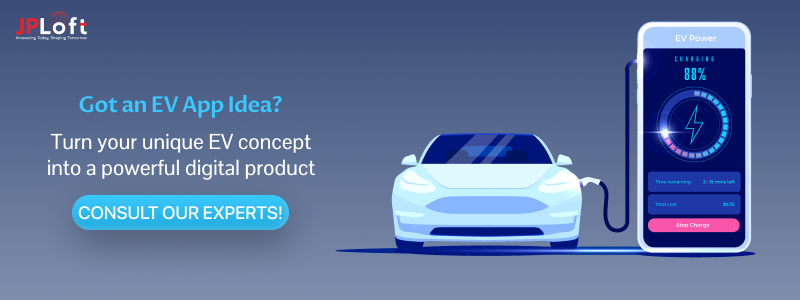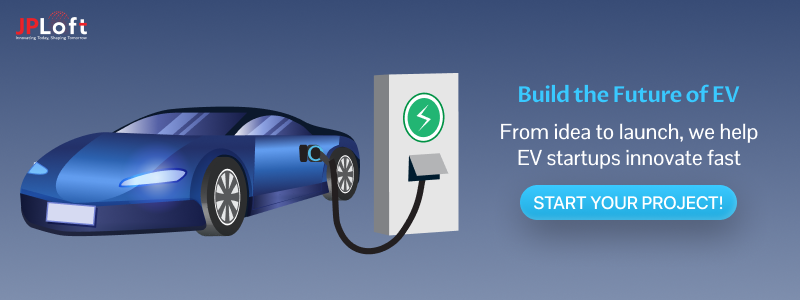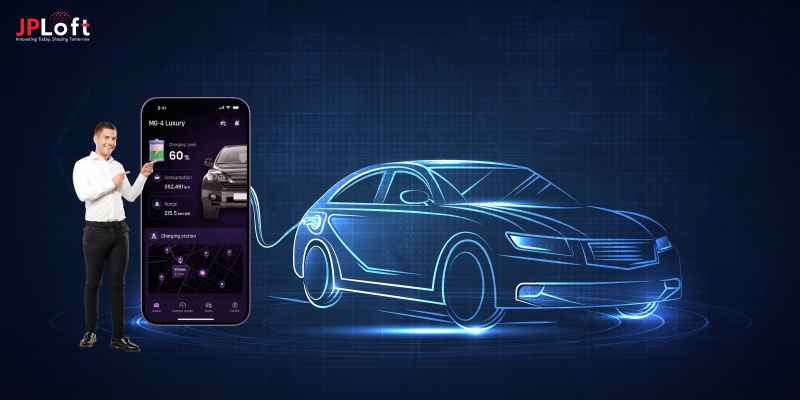Thinking about diving into the electric vehicle (EV) space? You’re not alone—and honestly, there’s never been a better time.
As electric vehicles become more popular, the need for smart, useful, and interesting applications grows rapidly.
Drivers want more than just a way to charge their vehicles; they want tools that will allow them to plan routes, monitor battery life, locate local charging stations, and even track their eco-friendly driving habits.
That’s where the real opportunity lies. In this blog, we’ll walk you through some of the most unique EV app ideas that are not only useful but also have serious market potential.
So, whether you're an entrepreneur with a big idea or a business exploring EV app development, get ready—because these ideas might just spark your next big innovation.
Electric Vehicle (EV) Software Market: Key Statistics and Growth Insights
Here are some compelling key statistics and growth insights on the Electric Vehicle (EV) software market that will blow your mind, like how rapidly the market is evolving.
1. Market Size & Growth
-
- In 2024, the global EV software segment generated USD 4.66 billion in revenue and is projected to reach USD 15.58 billion by 2030. This estimates the market expansion at a CAGR of 22.3% from 2025 to 2030.
- More broadly, the overall EV software market—including charging, diagnostics, fleet, and infotainment software—was estimated at USD 22.46 billion in 2024. It is likely to grow up to USD 114.9 billion by 2032, showcasing a 22.6% CAGR between 2024 and 2032.
2. Charging & Fleet Management
-
- The EV charging software market stood at USD 6.5 billion in 2023 and is expected to grow to USD 32.7 billion by 2033. It showcases a growth of 17.6% CAGR.
- The EV fleet management software market was valued at USD 1.6 billion in 2023 and is projected to reach USD 6.8 billion by 2033, growing at a 15.9% CAGR.
3. Regional Highlights & Market Drivers
-
- By 2025, almost 80% of new electric vehicles around the world are expected to come equipped with smart software systems. From real-time telematics to autonomous driving support and connected infotainment, software is quickly becoming the heart of the EV experience.
- The infotainment software segment is booming in Asia-Pacific, holding 41.3% of the regional market in 2023.
- Key drivers include EV adoption, supportive government policies, the expansion of charging infrastructure, and technological trends like AI, IoT, and cloud integration.
Why It Matters?
Robust growth across these software ideas for electric vehicles showcases a massive digital opportunity in the EV sector.
Whether you're building route-planning apps, battery viewers, IoT-based diagnostic tools, or smart payment systems, there’s huge market potential ahead.
Why Invest in EV Software Development?
As electric vehicles take over the roads, smart software is what sets them apart. If you're thinking of entering the EV space, this is the time to explore powerful and user-friendly EV software development ideas.
1] The Future is Electric – and Smart
EVs are more than just vehicles; they're smart devices on wheels.
Therefore, investing in EV software development allows you to tap into the growing demand for intelligent features such as route optimization, battery health monitoring, and smart charging.
If you're ready to make a mark in this evolving market, now is the time to create an app that offers innovative solutions and an exceptional user experience.
2] Massive Market Potential
The electric vehicle industry is expanding rapidly, and so is the need for supportive digital infrastructure.
From fleet management tools to mobile apps for EV owners, there’s a huge market waiting to be explored.
So, you can plan to design an EV app backed by a great app idea for electric vehicles today can become the go-to solution for tomorrow.
3] Sustainability Meets Innovation
Nowadays, consumers are not just looking for eco-friendly transport. In fact, they want smart, sustainable experiences.
With the help of innovative software ideas for an EV, users can track carbon savings, find nearby chargers, and make greener choices effortlessly.
4] Monetization Opportunities
EV software isn’t just good for the planet, but is good for business too. You can check out the potential ways through which EV apps make money and can plan your app scalability accordingly.
Whether it’s through subscription models, partnerships, or in-app purchases, the right features can unlock long-term app revenue streams.
Top 15 Electric Vehicle App Development Ideas for 2025 and Beyond
As the electric vehicle market surges forward, businesses have a golden opportunity to lead innovation through smart, user-centric mobile apps.
These EV app development ideas aren’t just trendy—they solve real-world challenges, boost user experience, and unlock new revenue streams.
Whether you're a startup or an established brand, tapping into these ideas can future-proof your presence in the e-mobility space.
1. Smart Charging Scheduler
Smart charging scheduler apps are among the best EV ideas for 2025, especially for businesses looking to enter the EV software market.
These apps empower EV owners to charge their vehicles during off-peak hours, reducing electricity bills and easing grid load.
By using intelligent algorithms, the app aligns charging times with user routines, utility tariffs, and renewable energy availability.
It connects with the vehicle’s charging system and the local grid, using real-time data to make optimal decisions.
- How Does It Work?
The app leverages API integrations with the EV and electricity provider to determine the best time to initiate charging. It can schedule or delay charging based on dynamic pricing models and user preferences.
- Importance of the App
With energy consumption rising, this app idea for electric vehicle owners—smart scheduling—helps conserve electricity and reduce costs. It also supports grid efficiency and minimizes the environmental footprint of charging.
2. Battery Health Monitoring App
Battery health monitoring apps give EV owners detailed insights into their battery's condition, charging cycles, degradation rate, and performance trends. As one of the most practical electric vehicle software development ideas, these apps collect and analyze data in real time to alert users of any abnormalities or potential failures.
- How Does It Work?
By connecting with the vehicle’s Battery Management System (BMS), the app tracks temperature, voltage, and energy output. It provides daily health summaries, suggests maintenance, and estimates battery life.
- Importance of the App
Since the battery is a costly EV component, proactive monitoring can extend its life and prevent sudden breakdowns. It also improves overall vehicle reliability.
3. Route Planning & Optimization
EV route planning apps help users travel efficiently by offering optimal routes based on battery range, charging points, and terrain. Among the most valuable ideas of software for electric vehicles, these apps reduce energy consumption and improve travel reliability, especially on long drives.
- How Does It Work?
Using GPS, AI, and real-time traffic data, the app maps the best route while identifying charging stations along the way. It considers charging time, battery condition, and external factors like road inclines and weather.
- Importance of the App
Unlike fuel cars, EVs require more planning. This app prevents range anxiety, avoids low-battery emergencies, and helps users arrive on time.
4. EV Fleet Management Software
This app is tailored for businesses managing a fleet of electric vehicles and stands out among the top software ideas in the EV industry. It offers real-time tracking, battery monitoring, driver performance analysis, and predictive maintenance scheduling.
- How Does It Work?
The software integrates with each vehicle’s telematics, offering centralized data on vehicle location, charge level, usage, and faults. It can also automate route assignment and maintenance alerts.
- Importance of the App
Fleet operators benefit from building a fleet management app, as it ensures optimized performance, reduced downtime, and reduced operational costs. It is essential for commercial logistics and transport services to ensure seamless EV integration in their fleet.
5. Peer-to-Peer Charging Network
This innovative app creates a decentralized charging network by allowing EV owners to rent out their personal chargers. It enhances access to charging points in areas with limited infrastructure.
- How Does It Work?
This concept represents one of the more innovative ideas in software for electric vehicles. Users list their chargers on the app, set rates and availability, while others can book and pay through the platform. Location-based services and user reviews help build trust.
- Importance of the App
This model empowers communities to support clean mobility and fills the gaps left by commercial charging providers, especially in suburban and rural regions.
6. Over-the-Air (OTA) Update Platform
OTA platforms let manufacturers and developers push updates directly to EV systems without physical service visits. These updates can improve functionality, fix bugs, or enhance vehicle safety.
- How Does It Work?
The app securely connects to the EV’s system through cellular or Wi-Fi networks. It downloads and installs verified updates without driver intervention. This feature is becoming increasingly popular in modern electric vehicle app ideas focused on seamless user experience and vehicle connectivity.
- Importance of the App
This ensures vehicles remain up-to-date with the latest features and compliance requirements, improving longevity and user experience.
7. Smart Home Energy Integration
With this app, users can sync their EV charging with home solar panels or battery storage systems to maximize energy savings and eco-efficiency. It's one of the more creative software ideas for EV owners looking to make the most of renewable energy at home.
- How Does It Work?
The app connects with both the home energy system and the EV to decide when to charge or discharge based on energy generation and consumption.
- Importance of the App
It reduces electricity bills and promotes clean energy use, turning the home into a sustainable energy ecosystem.
8. Range Anxiety Buster App
This app helps reduce driver stress by offering real-time range predictions, low-battery alerts, and backup charging options. Solving one of the most common pain points for EV users, it’s a great example of how electric vehicle app ideas are shifting toward driver-first design.
- How Does It Work?
By analyzing real-time vehicle and environmental data, the app offers range estimates and alerts users when a charge is needed. It also shows the nearest stations.
- Importance of the App
It increases driver confidence and makes EVs more accessible to mainstream users by eliminating one of the top adoption barriers.
9. Maintenance & Remote Diagnostics App
This app remotely monitors EV performance and notifies users of issues before they become serious. It supports predictive and preventative maintenance, an advanced solution that’s best built when you hire dedicated developers with expertise in connected car technology.
- How Does It Work?
By syncing with the EV’s onboard diagnostics, it reads error codes, logs performance data, and sends alerts or service reminders to the user.
- Importance of the App
Minimizing surprise breakdowns and repair costs is key to EV reliability. This tool keeps vehicles in top shape and extends their service life.
10. Charging Station Locator & Finder
Another innovative and scalable EV app idea includes building an EV charging station finder app. This app helps EV drivers find the nearest charging station, check availability, and reserve a slot, all from one interface.
- How Does It Work?
It uses GPS to identify user location and lists nearby stations with real-time data like plug types, speeds, prices, and reviews. Users can navigate directly or reserve slots.
With innovations like this gaining momentum, electric vehicle app ideas are increasingly focused on solving infrastructure-related EV challenges.
- Importance of the App
Reliable access to chargers is crucial for smooth EV adoption. This app reduces delays and ensures peace of mind during travel.
11. Eco‑Driving Coach
An eco-driving coach app encourages users to adopt efficient driving habits by analyzing behavior and providing tips or gamified rewards.
- How Does It Work?
The app monitors driving data—such as acceleration, braking, and speed—via sensors. It scores performance and suggests areas for improvement.
Solutions like this continue to lead the way in electric vehicle software development ideas that focus on both sustainability and user engagement.
- Importance of the App
Efficient driving can extend battery life, reduce costs, and lower emissions. This app promotes sustainability while making driving more fun.
12. EV Mobile Charging Software
Considering the rapid rise in EV adoption and the shifting interest of users towards sustainability, the need for smart EV charging stations is also increasing.
But the EV charging infrastructure is constantly failing to keep up with the EV sales globally, hence an innovative EV app idea can be to start an EV mobile charging business.
- How Does It Work?
The app allows users to book a mobile EV charging station as per their convenience and location. The app processes the request and schedules the charging van as per the customer's request. At the set time, the mobile van reaches the customer's doorstep and charges the EV.
- Importance of the App
Such a mobile EV charging platform adds convenience and comfort for the users. It also highlights how EV app development ideas can enhance both functionality and convenience for users.
13. EV Rental & Sharing App
This app facilitates short-term rentals and car sharing, helping users access electric vehicles without owning one.
To build a smooth, user-friendly experience, collaborating with the best mobile app development company ensures the platform is scalable, secure, and intuitive.
- How Does It Work?
Users can browse available EVs, book one nearby, and unlock it using their phone. The app tracks mileage, time, and handles payments.
- Importance of the App
It promotes EV accessibility, reduces congestion, and supports the shift toward shared, sustainable urban mobility.
14. Vehicle‑to‑Grid (V2G) Integration App
A V2G app lets EVs send power back to the grid or a home battery, enabling dynamic energy management. It’s among the most forward-looking ideas of software for software vehicles, pushing the boundaries of how EVs interact with the energy ecosystem.
- How Does It Work?
Through bi-directional charging, the app monitors grid demand and user preferences to determine when energy can be stored or returned.
- Importance of the App
This turns EVs into mobile energy assets, helping stabilize the grid and offset electricity costs.
15. Telematics & Predictive Maintenance Tool
This tool tracks real-time EV data to anticipate service needs and detect anomalies before they cause failures.
- How Does It Work?
Using machine learning and vehicle telematics, the app identifies usage patterns and sends alerts or maintenance reminders. Solutions like this are great examples of how EV app ideas are evolving to include predictive intelligence and preventive care.
- Importance of the App
It helps businesses and drivers prevent costly repairs, reduce downtime, and extend the lifespan of their electric vehicles.
How JPLoft Can Help You Build the Next Big EV App
At JPLoft, we don’t just build apps—we bring your EV app idea to life with innovation and strategy. Whether you're a startup or an enterprise, we help you create an app that aligns with your business goals and user needs.
Looking for the best EV ideas for 2025? Our team stays ahead of trends to deliver cutting-edge solutions tailored for the electric vehicle industry.
We specialize in EV app development ideas that not only enhance user experience but also integrate seamlessly with IoT and smart mobility systems.
From concept to launch, we assist with every app idea for electric vehicle services, focusing on performance, scalability, and user engagement.
As a trusted EV software development company, we also help you hire dedicated developers who understand the intricacies of software ideas for electric vehicles and deliver robust solutions.
Let’s build the future of eMobility—together.
Conclusion
The electric vehicle revolution is more than just a trend—it’s the future of transportation. And as EV adoption accelerates globally, the demand for intelligent, user-centric software is rising just as fast.
Whether it's optimizing battery performance, enabling seamless charging, managing fleets, or enhancing the driver experience, the app ideas outlined in this blog offer immense potential for innovation and impact.
Now is the perfect time to turn your vision into reality. By investing in thoughtful, scalable, and forward-thinking EV app ideas, you’re not just entering a booming market—you’re helping shape the future of clean mobility.
So, whether you're a startup with a disruptive idea or an enterprise ready to expand your digital footprint, take the leap. Partner with experts like JPLoft to develop EV applications that are not only technologically advanced but also built with purpose, precision, and performance.
The road to a smarter, greener tomorrow starts with your next big electric vehicle app idea. Let’s drive it forward—together.
FAQs
Some unique EV app ideas include smart charging station locators, EV route optimization tools, and battery health monitoring apps. Other innovative concepts involve EV fleet management software, peer-to-peer charging platforms, and apps that gamify eco-driving habits.
The EV industry is growing rapidly due to environmental concerns and government incentives. This creates a rising demand for mobile apps that solve real-world EV user problems, making it a prime market for innovation and growth.
EV apps enhance the user experience by offering features like real-time charging station availability, trip planning with charging stops, remote vehicle diagnostics, and seamless payment integration—all from a mobile device.
EV apps often leverage GPS, IoT, AI, real-time data analytics, and cloud computing to deliver accurate, responsive, and intelligent features for both users and operators.
Monetization strategies include subscription models, in-app purchases, freemium features, advertising, and partnerships with charging networks or vehicle manufacturers.













Share this blog